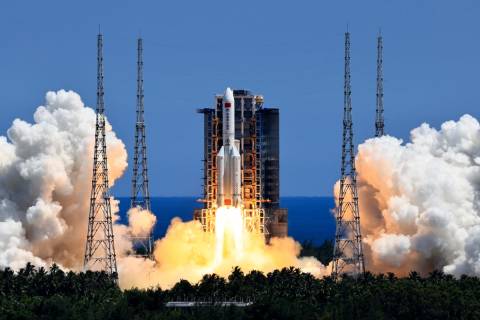The out of control core stage of a Chinese Long March rocket burned up over the Indian Ocean Saturday, drawing criticism from Nasa over China’s handling of the situation.

The 21-ton Long March 5B booster launched on 24 July to deliver a new module to China’s Tiangong space station. But unlike a reusable rocket booster that can make a powered descent, such as the SpaceX Falcon 9, the Long March rocket was left to tumble out of control until its orbit naturally degraded and it fell back to Earth.
That fall took place around 12.45pm EDT Saturday, over the Indian Ocean near Malaysia, according to US Space Command.
On Saturday, a number of Twitter accounts began sharing video of what could be the rocket breaking up over Malaysia, but it has not been confirmed if the video is actually showing the remains of the rocket.
What is known is that larger rocket boosters are massive enough that they typically do not burn up entirely during reentry, with as much as 40% of their mass reaching the ground, particularly heat resistant components such as tanks and engine parts. These debris can threaten livens and property on the ground.
Shortly after 2pm EDT Saturday, Nasa administrator Bill Nelson released a statement, by email and on Twitter, admonishing China for not providing better information on the projected reentry trajectory of their rocket.
“All spacefaring nations should follow established best practices, and do their part to share this type of information in advance to allow reliable predictions of potential debris impact risk, especially for heavy-lift vehicles, like the Long March 5B, which carry a significant risk of loss of life and property,” Nelson said in the statement. “Doing so is critical to the responsible use of space and to ensure the safety of people here on Earth.”
Saturday’s reentry marks the third time China has let a rocket reentry the Earth’s atmosphere uncontrolled.
In May 2021, another rocket carrying part of the Chinese space station was left to circle the Earth once every 90 minutes before breaking up over the Indian Ocean about a week later. In 2020, another Long March rocket crashed into the Atlantic Ocean just 13 minutes fromhitting New York City.
